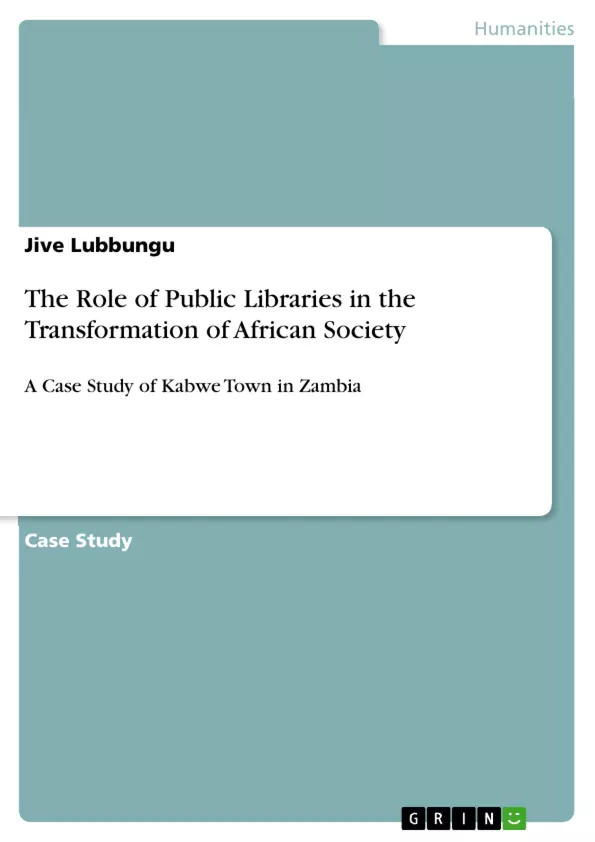The study examines the role of five public libraries in Kabwe whether they have lived up to their expected roles. The study is a case study using a qualitative paradigm, and data was collected through physical visitation to the libraries. Data collection instruments used were an observation guide and a semi-structured interview guide. 5 library staff were interviewed, one from each library, while 3 library users were interviewed from each library.
Libraries are the purveyor of information, custodian of knowledge, and the house of learning and play a vital role in the development of any society by catering for information needs of thousands of people within a particular community. Reding (2005) adds that libraries in our societies are stewards of our heritage, organisers of the knowledge in the books they collect, they take the knowledge of the past and present and lay it down for the future. Libraries are considered to be agents of educational, social, economic and political changes or revolutions in the community and their doors are now open to all who need them.
The present study examines the role of five public libraries in Kabwe whether they have lived up to their expected roles. The study revealed there was understaffing in the libraries coupled with demotivation. Presence of outdated books and lack of publicity on the existence of the libraries resulted in a low number of patrons to the libraries. Those who visited the libraries were either using their own materials or simply went to access newspapers to learn about current affairs. The study further revealed that there was an average of 15 people per day who accessed the library. Further, none of the interviewed library users visited the library for recreational reading but to prepare for exams or read the newspaper for current affairs. However, the library authorities were in the process of putting in place plans to encourage the communities to appreciate the existence of the libraries. Some plans underway included library commemoration activities in June 2019 whose theme is "Library =(is equal) to strong communities" and the introduction of a pre-school at Makululu compound Environmental Public Information Centre (EPIC) among others.
In view of the above findings, the paper argues that the role of the libraries in transformation of communities in Kabwe still remains an illusion, as a lot needs to be done if the book has to leave a footprint in society. The study further argues that in the absence of the latest materials that also caters all fields, the community cannot be inspired to visit the library. Ultimately, produce a cadre of people who do not put premium in reading, thereby breed a society that is not critical. One of the major footprints of the book is that people become educated and learn how to conform to their behaviours. Perhaps this explains why most youths in Kabwe indulge themselves in alcohol abuse because libraries do not exist in their minds as recreational centres.
Inhaltsverzeichnis (Table of Contents)
- Abstract
- Background
- Review of Related Literature
Zielsetzung und Themenschwerpunkte (Objectives and Key Themes)
This study investigates the role of public libraries in the transformation of African societies, focusing on the specific case of Kabwe Town in Zambia. The paper aims to determine whether these libraries are fulfilling their expected roles and contributing to community development.
- The role of public libraries in African societies
- The challenges faced by public libraries in Zambia, particularly in Kabwe
- The impact of limited resources and infrastructure on library services
- The importance of information access for community development
- The potential of libraries to promote literacy and lifelong learning
Zusammenfassung der Kapitel (Chapter Summaries)
- Abstract: This section provides a brief overview of the study, highlighting the importance of public libraries and their potential role in societal development. It introduces the case study of Kabwe Town in Zambia and outlines the research methods employed.
- Background: This section delves into the historical context of libraries and their significance in providing access to knowledge and information. It discusses the role of libraries in promoting literacy, education, and community development. The section also highlights the challenges faced by libraries in Zambia, including limited resources, infrastructure, and public awareness.
- Review of Related Literature: This section examines existing research on the role of public libraries in Africa, focusing on their contribution to literacy efforts and development projects in various communities. It explores initiatives by the African Library and Information Associations and Institutions (AfLIA) to empower innovations and expand the purpose of African libraries.
Schlüsselwörter (Keywords)
The main keywords and focus topics of this study are: public libraries, transformation, roles, communities, Kabwe, reading, footprint, access to information, literacy, development, and community information.
Frequently Asked Questions
What is the role of public libraries in Kabwe, Zambia?
Libraries in Kabwe are intended to be purveyors of information and agents of educational and social change, though they currently face significant challenges.
What are the main challenges faced by these libraries?
Key issues include understaffing, demotivation, outdated book collections, and a lack of public awareness about their existence.
Why do people visit libraries in Kabwe?
Most users visit to read newspapers for current affairs or to use the space for exam preparation, rather than for recreational reading.
How many people use the libraries on average?
The study revealed an average of only 15 people per day accessing the library services.
What initiatives are being planned to improve library usage?
Plans include library commemoration activities and the introduction of pre-schools at certain environmental information centers to encourage community engagement.
- Quote paper
- Jive Lubbungu (Author), 2020, The Role of Public Libraries in the Transformation of African Society, Munich, GRIN Verlag, https://www.hausarbeiten.de/document/960362


